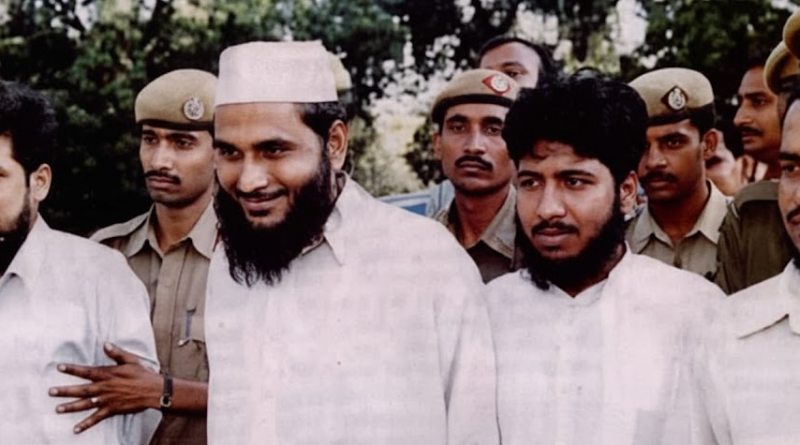24-Years After India Banned SIMI: A Prisoner Speaks From the Shadows
When asked what finally broke the camel’s back, he explained that tensions within SIMI had been simmering…
The interviewee is a senior jailed leader of the Students Islamic Movement of India (SIMI), imprisoned for over 15 years across various district and central prisons, with several trials still pending. This reporter met him during a court hearing. SIMI, banned in 2001, was a student organization accused of extremist activities.
His name appears in Indian Mujahideen: The Enemy Within by Shishir Gupta as an attendee of the 2006 Ujjain meeting, and in multiple intelligence and media reports linking him closely to Safdar Nagori and other top SIMI leaders. And at the time of his arrest undoubtedly top 10 leaders of the organization. He spoke on strict conditions of anonymity.
The interview has been edited and condensed.
He says his journey into SIMI began rather innocuously — through a study centre in his locality operated by the organization. “I used to go there simply to study. They had good study material,” recalls the senior leader, now in his mid forties. But, he admits, that space gradually became his entry point into a world of ideas that would go on to take him to the path of Political Islam.
“Before the ban, I was not very active, I came into contact with them only eight months before the Ban” he says candidly. But the government’s ban on SIMI in 2001, he says, was a turning point. “It made me rethink my ideas, and the larger question of how Islam is being attacked in India. I began to ask myself — if an organization or an ideology is so vehemently targeted by the state, then perhaps there’s something in it that unsettles the powers that be.”
It was this line of thought that pushed him deeper into the Underground Islamist movement. “I began reading more, and became more active after the Ban,” he says.
By Mid 2004, he found himself drawn into the organization’s inner circles. He recalls being part of several meetings that would later culminate in the eventual split within SIMI.
When asked what finally broke the camel’s back, he explained that tensions within SIMI had been simmering since Shahid Badr Falahi, SIMI President’s release from prison. By then, Falahi had already developed ideological differences with Safdar Nagori’s faction.
Yet, the breaking point came with a meeting in Bengaluru, where a committee was formed to promote and campaign for an international Caliphate ( Khilafat) and explore possible approaches for jihad in India. When Falahi returned to Azamgarh, he and his supporters denounced these resolutions as reckless and suicidal.
Within twenty days, another meeting was convened in Azamgarh to revoke the Bengaluru decisions—an episode that coincided with Falahi’s formal retirement. “The revocation unsettled me no end, I realized then that they lacked the conviction to carry the struggle forward. The split that followed was inevitable—they were cowardly and hypocritical, willing to sacrifice Islam and the so-called radicals, to preserve SIMI’s image.”
When Falahi retired, he directed his supporters to withdraw completely from all forms of organizational work and activism. He instructed them to suspend any plans for agitation or mobilization and instead focus their entire effort on challenging the government’s proscription of SIMI before the Tribunal.
This marked a decisive shift in SIMI’s internal orientation, signaling Falahi’s preference for a legal and defensive strategy over the confrontational path advocated by Nagori’s faction.
When asked about the approach of Falahi to go to the Tribunal to lift the ban, he scoffed: “How long have they been running to the Tribunal?” After this reporter answered “about 24 years,” he said, “There’s your answer. The Tribunal won’t solve this. We’ve wasted lakhs on that foolish body — seeking justice from the court of Batil (False Hood) will never restore the forces of Allah and His Messenger.
When Justice Gita Mittal’s tribunal lifted the SIMI ban on 5 August 2008, the Union government immediately ran to the Supreme Court and obtained a stay the very next day. Even if the Tribunal decides in our favour it is of no use to us.
“The so-called moderate SIMI was filled with corrupt people,” he remarked sharply.
“Let me tell you an incident—you know X , right?” he asked this reporter, I nodded in recognition. “He was suspended because he embezzled one lakh rupees from SIMI’s funds for his personal use. That’s your ‘moderate’ SIMI—the one celebrated by Muslim activists and sections of the left-leaning media as the real, legitimate organization.”
He paused before adding, “They were morally compromised. That’s precisely why they were accepted by the mainstream.”
“This was not a one-off incident,” he emphasized. “It kept happening. The so-called Islamist activists, the self-styled mujahids, were involved in such acts repeatedly—even as they projected piety and hurled moral questions at others. We at the lower ranks had no idea.
Only after rising within the organization did I begin to see how deep it ran. It was rampant, pervasive, and never made public, there was widespread corruption at the upper echelons of SIMI.”
He also accused Falahi faction of siding with the state and framing the Nagori Group, while projecting that a “hardline group” within SIMI pushed for militancy, and had hijacked the organization and he was fighting the same people that the state was fighting.
By March 2006, the movement had practically become defunct, he says. Those who came to be labelled by the media as the Nagori group, he adds, were trying to revive the movement and continue its work.
Reflecting on his own activism and ideas , he says many of those later branded as the Nagori group were influenced by the Taliban’s regime in Afghanistan, which he saw as the only “true” example of social justice and Islam.
“I read that a bag of money lay untouched for three days in Kabul,” he said. “That is Islam’s justice.” If we seek to implement the same in India, what is wrong?
If Hindutva forces can openly demand a Hindu Rashtra with the ruling party’s and its parent organizations blessing, why should Muslims be ashamed to assert their own religious aspirations?
In a democracy, we have the same right to state our convictions — not a version concocted by mullahs or madrasas, but one grounded in the teachings of Allah and His Prophet. We are not inventing Islam; we are reclaiming the faith’s principles and asking for the muslims to follow what they claim to follow.
“Modi and Yogi have made our work easier—the rage is already there. The Muslim masses are crying out for a movement like SIMI. But the cowards and hypocrites who call themselves leaders of the Muslim community, this spineless leadership, cannot channelize that anger. They have betrayed the very people they claim to represent.”
On being asked about his thoughts of SIMI being involved in Terrorist acts? He said, “At the 2006 Ujjain meeting we resolved to carry out targeted attacks on Hindutva leaders and state agents we held responsible for crimes against Muslims — but we explicitly rejected suicide bombings and indiscriminate terror”.
Although the state has blamed SIMI for many attacks, he insisted, “We have never killed an Indian civilian” and categorically denied involvement in terrorist attacks.
He conceded the organisation discussed and even shortlisted targets — naming Pravin Togadia and L.K. Advani — arguing such killings would “send a strong message” to those who, in his view, violated the sanctity of their faith.
Apart from that admission, he told the reporter that much of what is already in the public record about the group’s activities is broadly accurate except the aspect mentioned above, that “SIMI was involved in terrorist activities”.
As the interview neared its end, he was asked about his thoughts on Safdar Nagori. His response was firm, “Safdar Nagori is a hero. He has never bowed before batil (falsehood), and he never will. We are proud of him and confident in his resolve. We expect nothing but our eventual release or martyrdom, Inshallah.”
Disclaimer: Views expressed by writers in this section are their own and do not reflect Milli Chronicle’s point-of-view.



